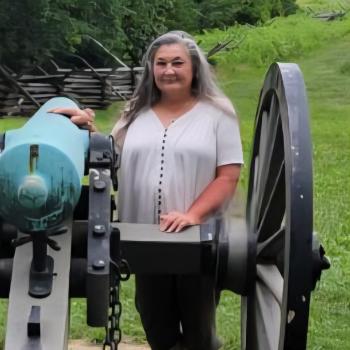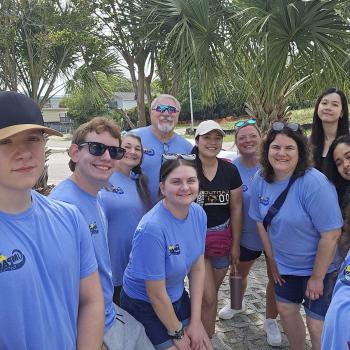
Do You Love the Unlovely?
The parable is familiar. The message is, too. As Christians, we are charged to love the unlovely.
“Then the King will say to those on his right, ‘Come, you who are blessed by my Father; take your inheritance, the kingdom prepared for you since the creation of the world. For I was hungry and you gave me something to eat, I was thirsty and you gave me something to drink, I was a stranger and you invited me in, I needed clothes and you clothed me, I was sick and you looked after me, I was in prison and you came to visit me.’
“Then the righteous will answer him, ‘Lord, when did we see you hungry and feed you, or thirsty and give you something to drink? When did we see you a stranger and invite you in, or needing clothes and clothe you? When did we see you sick or in prison and go to visit you?’
“The King will reply, ‘Truly I tell you, whatever you did for one of the least of these brothers and sisters of mine, you did for me’” (Matthew 25:34-40).
The Story of John Blanchard and Hollis Maynell
John Blanchard stood up from the bench, straightened his Army uniform, and studied the crowd of people making their way through Grand Central Station. He looked for the girl whose heart he knew, but whose face he didn’t, the girl with the rose.
His interest in her had begun thirteen months before in a Florida library. Taking a book off the shelf he found himself intrigued, not with the words of the book, but with the notes penciled in the margin. The soft handwriting reflected a thoughtful soul and insightful mind. In the front of the book, he discovered the previous owner’s name, Miss Hollis Maynell. With time and effort he located her address. She lived in New York City. He wrote her a letter introducing himself and inviting her to correspond. The next day he was shipped overseas for service in World War II.
During the next year and one-month the two grew to know each other through the mail. Each letter was a seed falling on a fertile heart. A romance was budding. Blanchard requested a photograph, but she refused. She felt that if he really cared, it wouldn’t matter what she looked like.
When the day finally came for him to return from Europe, they scheduled their first meeting – 7:00 PM at the Grand Central Station in New York. “You’ll recognize me,” she wrote, “by the red rose I’ll be wearing on my lapel.” So at 7:00 he was in the station looking for a girl whose heart he loved, but whose face he’d never seen.
I’ll let Mr. Blanchard tell you what happened:
A young woman was coming toward me, her figure long and slim. Her blonde hair lay back in curls from her delicate ears; her eyes were blue as flowers. Her lips and chin had a gentle firmness, and in her pale green suit she was like springtime come alive. I started toward her, entirely forgetting to notice that she was not wearing a rose. As I moved, a small, provocative smile curved her lips. “Going my way, sailor?” she murmured.
Almost uncontrollably I made one step closer to her, and then I saw Hollis Maynell. She was standing almost directly behind the girl. A woman well past 40, she had graying hair tucked under a worn hat. She was more than plump, her thick-ankled feet thrust into low-heeled shoes. The girl in the green suit was walking quickly away. I felt as though I was split in two, so keen was my desire to follow her, and yet so deep was my longing for the woman whose spirit had truly companioned me and upheld my own. And there she stood. Her pale, plump face was gentle and sensible, her gray eyes had a warm and kindly twinkle.
My fingers gripped the small worn blue leather copy of the book that was to identify me to her. This would not be love, but it would be something precious, something perhaps even better than love, a friendship for which I had been and must ever be grateful. I squared my shoulders and saluted and held out the book to the woman, even though while I spoke I felt choked by the bitterness of my disappointment. “I’m Lieutenant John Blanchard, and you must be Miss Maynell. I am so glad you could meet me; may I take you to dinner?”
The woman’s face broadened into a tolerant smile. “I don’t know what this is about, son,” she answered, “but the young lady in the green suit who just went by, she begged me to wear this rose on my coat. And she said if you were to ask me out to dinner, I should go and tell you that she is waiting for you in the big restaurant across the street. She said it was some kind of test!”
Other than the actions of a careful woman, I think this story teaches that we must be careful how we evaluate what is “lovely.”
A Story From St. Francis of Assisi
When Francis of Assisi left his life of privilege and set out to serve the Lord, he had an interesting encounter on the road. According to Friarmusings, the story goes like this:
“Among all the awful miseries of this world Francis had a natural horror of lepers, and one day as he was riding his horse near Assisi he met a leper on the road. He felt terrified and revolted, but not wanting to transgress God’s command and break the sacrament of His word, he dismounted from his horse and ran to kiss him. As the leper stretched out his hand, expecting something, he received both money and a kiss. Francis immediately mounted his horse and although the field was wide open, without any obstructions, when he looked around he could not see the leper anywhere.” Francis always believed that was an encounter with Jesus.
A Story From My Past
These days, Jesus still challenges us to reach out to the needy, the forgotten, and the unattractive. In fact, I had a situation very much like that of St. Francis’. I wrote about this before, but it begs repeating in this context”
One evening, more than a decade ago as Christmas was approaching, I was racing into Walmart to grab a few last-minute items. As I neared the entrance, I noticed a man in a wheelchair almost blocking my path. He had only one leg and part of one of his hands was missing. He was incredibly ragged and when I got close I could smell him. He was begging for money. My reaction—discomfort, embarrassment and repulsion. I wish I could put that word in a smaller font. Even if he had been clean and in the church foyer, I think I still would have tried to avoid him, because I just never knew how to respond to people with such extreme physical challenges. I walked within feet of him, smiled without making eye contact, voiced a weak “hello,” and quickened my pace until I was safely inside the store thinking, “Maybe he’ll be gone by the time I come out.”
I was in the middle of the frozen food section (ironically) when I was hit by such shame and conviction that tears came to my eyes. I was so blessed. I had a wonderful, healthy family, good personal health, a beautiful, clean home, and I was heading that evening for a Christmas party with dear loving friends—things he obviously did not have. How could I be harboring such a frozen heart?
I didn’t have much cash with me, so I quickly put a few items back. “Lord, let him still be there when I get back!” I paid for my items, got my change and raced out the door. There he was! I walked over to him and handed him the money, and then Jesus took over!
“Do you know Jesus, Sir?”
“Yes, Ma’am.”
“Do you know how much He loves you?”
No answer, just tears.
“May I pray with you?”
“Yes.”
I knelt by this man and took hold of his mutilated hands, and prayed for him gently. I did not pray for his healing, but I prayed that his needs would be met and that his heart would be overwhelmed by the love of His heavenly Father. Then I hugged him. The funny thing is, I don’t think I prayed for him so much because he needed it, although we can all use the prayer and encouragement of another, as because I needed it. I have often wondered if he was an angel sent to teach me a lesson.
I needed to learn to love more like Jesus and to recognize the hurt of others through His eyes. You see, the thing that convicted me in the frozen food section was that God gave me just a glimpse of the way I looked to Him before I asked Jesus into my heart. I was ragged, filthy, stinking to high heaven, and so incomplete—much worse off than that man at the door. How could I not reach out to a fellow human soul after what Jesus had done for me? (https://www.patheos.com/blogs/ichasesunsets/2023/12/a-difficult-christmas-memory/)
Approaching the “Unlovely”
Recently, I was in Orlando with the senior class from the school where I teach. We spent an evening serving at a place called Straight Street.
Straight Street is a very unusual kind of a dinner service for the homeless. It is not at all like others I have helped in where people come in and get a plate, walk down the service line where food is put on the plate, then find a place to sit.
No, at Straight Street, the people come in and are directed to tables where utensils and glasses of ice water are served to them by a volunteer. The plate is also brought and served individually by a volunteer, as in a restaurant. There is an opportunity for pleasantries to be exchanged. There is an element of dignity offered to those who are on the streets–valuable human souls who are loved by God.
“All That is Gold Does Not Glitter”
One of my favorite quotations from J. R. R. Tolkien’s The Lord of the Rings did not make it to the movie. It says:
“All that is gold does not glitter; not all those who wander are lost.”
That is a powerful lesson. I give it to the graduating seniors every year on one side of a laminated, business-sized card. The other side holds an individual Bible verse intended only for the individual recipient. I ask each of them to put the card in their wallet, purse, jewelry box, or some place where it will be at hand, and I pray that on the day that they need a word of encouragement or blessing, that they will remember that little card, and that the words of the scripture will speak to them. I also pray that the words of Tolkien will remind them that not all valuable things can be judged at a glance.
“All that is gold does not glitter.” There is beauty that can not be seen with the naked eye. There is often value where we don’t see it. But God knows! He has hidden gold nuggets in plain earth, and often he has hidden treasure in the unlovely. If we ask, He will allow us to see through His lens.
Take a Chance
Take a chance! Reach out to the unlovely, the difficult, the dirty, the wandering.
As you begin to take those chances, it is important to remember that God is not judging your success by the other person’s response. That person may or may not choose to accept your offer or your prayer. That does not make you a failure.
The measuring stick is Mathew 25: Whatsoever you did for the least of these–the hungry, the thirsty, the naked, the imprisoned, the sick, the sad, the lonely–you have done it for me. Whether they accept is another matter between that person and God. Your responsibility is to be obedient.
Isaiah 58:5-8 says:
Is this the kind of fast I have chosen,
only a day for people to humble themselves?
Is it only for bowing one’s head like a reed
and for lying in sackcloth and ashes?
Is that what you call a fast,
a day acceptable to the Lord?
Is not this the kind of fasting I have chosen:
to loose the chains of injustice
and untie the cords of the yoke,
to set the oppressed free
and break every yoke?
Is it not to share your food with the hungry
and to provide the poor wanderer with shelter—
when you see the naked, to clothe them,
and not to turn away from your own flesh and blood?
Then your light will break forth like the dawn,
and your healing will quickly appear;
then your righteousness[a] will go before you,
and the glory of the Lord will be your rear guard.
That sounds a lot like the Matthew 25 verses.
“When I was hungry, you gave me something to eat; when I was thirsty, you gave me something to drink; when I was a stranger, you invited me in; when I needed clothes, you clothed me; when I was sick, you looked after me; when I was in prison, you came to visit me.”
When I was unlovely, you cared anyway.
You smiled at me; you talked to me; you held my hand; you gave me a cup of water. You acknowledged my worth.
You made a difference.
God bless you, and may you find love for the unlovely, and may you find joy as you conform more and more into the image of the Master.












